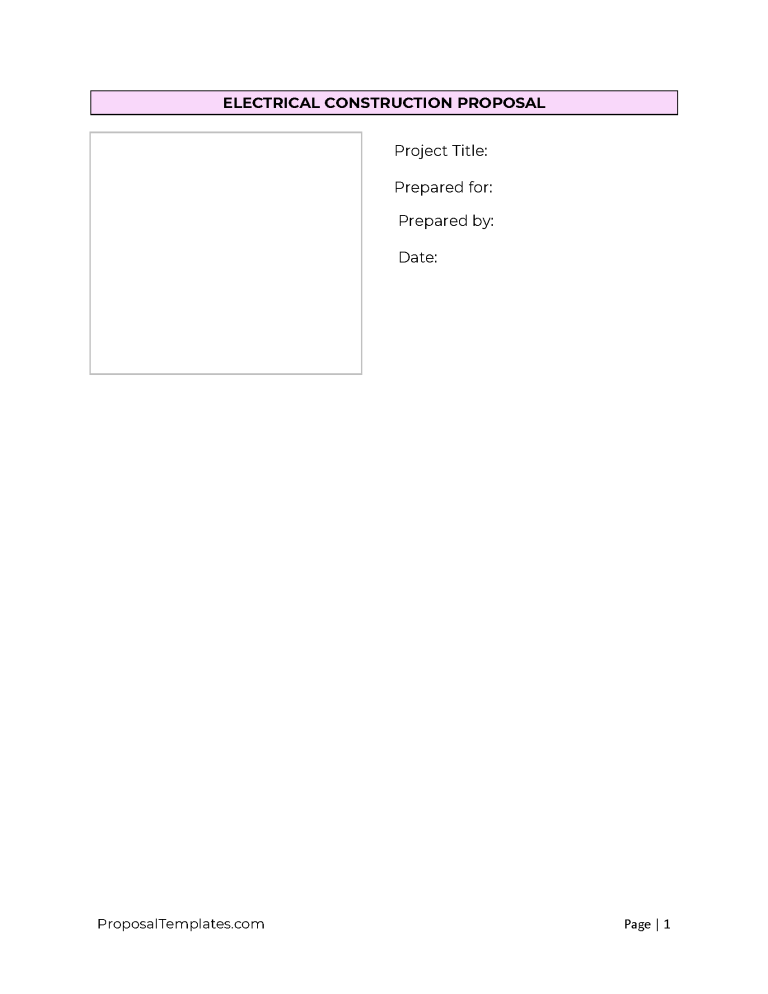Electrical proposals combine a client project’s summary with an electrician, construction company, or subcontractor’s plan to complete the job. The electrician business should compile a presentation ranging from cost estimates to past achievements to secure the desired contract.
Types of Electrical Proposals (10)
- Commercial Electrical – An electrical work proposal aimed at commercial properties (office buildings), thus containing sections on topics like load calculations, power distribution, and appropriate lighting.
- Data Center Electrical – An electrical construction proposal that will display the independent contractor or construction company’s proficiencies in areas such as setting up a reliable electrical infrastructure with the redundancy measures and backup units that data center clients require.
- Emergency Electrical Repair – A bid proposal that directly addresses specific issues requiring immediate electrical repair. The electrical contractor or company will detail its solution to the problem and the cost estimate for the job.
- Electrical Maintenance and Service – An electrical construction proposal covering an electrical business’s long-term maintenance service (troubleshooting, inspections, emergency services, etc.).
- Electrical Renovation – A bid proposal for projects where the electrical system has malfunctioned, failed safety inspections, or requires an upgrade.
- Generator Installation – Submitted for projects where the electrical contractor or construction company must install a generator, requiring a presentation of the generator specs, its cost, and the installation procedure used. Assurances to the long-term reliability of the generator will often be included.
- Lighting Retrofit – The bid proposal needed to approach potential clients for upgrading a lighting system (i.e., LED systems).
- New Construction Electrical – This proposal should be used for new buildings or first-time installations and will center on electrical code compliance and energy efficiency.
- Residential Electrical – An electrical bid proposal showcasing specialties such as home automation systems, safety measures, and grounding to secure electrical work with homeowners or residential building property owners.
- Solar Panel Installation – An electrical construction proposal catered to installing solar panels, including discussions on existing electrical systems, different types of solar panels, and potential energy savings.
What Should Be Included (12 Items) |
1. Introduction
Open the proposal with a presentation of the electrician business’s credentials and qualifications while setting an enthusiastic tone. Develop this section to impress the potential client accordingly.
- Electrician Business Name, Business Contact Information
- Objectives, Incentives
- Experience, Document Purpose
- Call To Action
2. Project Overview
Gather all the information from the electrical project site since a detailed report on the site environment will show the company’s assessment skills. Specifically, discuss all the technical aspects of the current site conditions and the concerned project.
- Site Condition, Project Goals, Client-Centric Wording
- Installation Overview, Timeline, Scheduling, Milestones
- Materials, Waste Disposal, Preparation, Cleanup
- Safety Codes, Regulatrory Compliance, Labor
- Insurance, Cost Estimates, Technology Integration
3. Scope Of Work
Document all activities and tasks the electrician must complete for the project while highlighting the milestones and important events for its completion. Describe actions such as electrical panel installations, wiring, and the steps needed to promote safety.
- Electric Project Setup, System Installation
- Wiring, Circuit Installation, Power Quality Analysis
- Panel Board, Conduit Routing, Switch/Outlet Installation
- HVAC Electrical Integration, Data Wiring
- Communication Wiring, Fire Alarms, Code Compliance
4. Electrical Specifications
Give a comprehensive review of every electrical component and piece that is required for the project. Additionally, discuss the electrical system’s specifications and how it will function upon installation.
- NEC (National Electrical Code) Compliance
- Voltage Requirements, Current Requirements
- Circuit Design Specifications, Electrical Panel Specifications
- Power Distribution System, Electrical Inspection Criteria
- Grounding, Energy Efficiency, Alarm Standards
5. Design And Layout
Present the design of the electric system being installed in detail. That is, ensure the client understands precisely where the electrical system will be.
- Blueprints, Diagrams, Energy Management
- CAD (Computer-Aided Design), Circuit Diagram
- Panel Board Configuration, Conduit Routing
- Generator Placement, Data Wiring Design
- Security System Layout, Electrical Safety Measures
6. Timeline
Report the electrician’s schedule for this project by documenting the first and last date of site work. Also, present the dates when essential project goals will be satisfied.
- Project Schedule, Mileston Planning
- Important Dates, Project Duration, Phases
- Timeline Management, Deadline-Oriented Electrical Work
- Consistent Progress Updates, Strategic Phases
7. Budget And Pricing
Itemize every electrical product, equipment rental, permit, and material for the project with its unit cost in addition to its quantity. Continue with a record of the labor costs of this project, together with the rate of payment for the electrician’s services.
- Electric Products/Supply (Quantity & Unit Price)
- Electrician Or Team Schedule (Time And Rate)
- Administrative Costs, Installation Rates
- Budget Conscious Materials, Project Cost Estimation
- Itemized Costs, Economic Solutions, Competitive Rates
8. Permits And Regulations
Display the permits and licenses needed in order to work on the electrical project. In addition, provide proof that any permissions required from the local, state, and federal government or licensing boards have been or will be met.
- Electricity Regulations, Permit Process
- Code Compliance, Regulatory Approvals
- Electrical Safety Standards, Electrical Inspection
- Electrical Code Updates, Inspection Checklist
- National Electrical Safety Code (NESC)
9. Insurance And Safety
Assure the potential electrical client that the electrician or business has the appropriate insurance policy for this project, specifically name the policy and the coverage held. Also, demonstrate the electrician business’s compliance with safety protocols and regulations.
- Insurance Policy Information, Documentation
- Electrical Liability Insurance, Insurance Requirements
- Risk Management, Workplace Safety
- Personal Protective Equipment (PPE)
- Hazard Statement, Incident Reporting
10. References And Portfolio
Showcase previous successful electrical work by the electrician or construction business, as well as any available testimonials. Also, dispense a list of references available for contact when the client follows up on this proposal.
- Catalogue Of Past Work, Client Testimonial
- References, Customer Reviews
- Endorsements, Electrical Repair Case Studies
- Electrical Contractor Reference List
- Successful Troubleshooting Examples
11. Terms And Conditions
Complete the proposal with the total estimated cost of the project, the conditions and the terms for payment, legal paperwork, and long-term maintenance options (i.e., warranties). Include any payment plan options available to the client for this project in addition to the paperwork required for the next steps.
- Electric Project Estimate
- Options To Payment
- Additional Service Plans
12. Contact Information
Finally, conclude the proposal with the contact information of the electrician, the construction company, or the subcontractor. In addition to the contact material, document the availability or office hours of the electric construction business.
- Electrical Business Name
- Address, Phone, And Fax
- Website and E-Mail Address

